YouGov examines how the nation fares on “Maslow’s hierarchy of needs”
In 1943 the American psychologist Abraham Maslow first outlined the concept for which he would become famous. His publication A Theory of Human Motivation detailed what has since become known as “Maslow’s hierarchy of needs”.
The general principle is that human needs exist in a hierarchy, and that lower needs such as those for food and safety must be fulfilled before higher needs like the desire for status and social acceptance can be tackled. All this leads to a pinnacle stage at which people are able to achieve true fulfilment.
Psychologists today no longer take such a rigid view, seeing the various stages as overlapping rather than strictly sequential. Nevertheless, the model still provides an interesting template through which YouGov has examined how far people feel their needs are being satisfied.
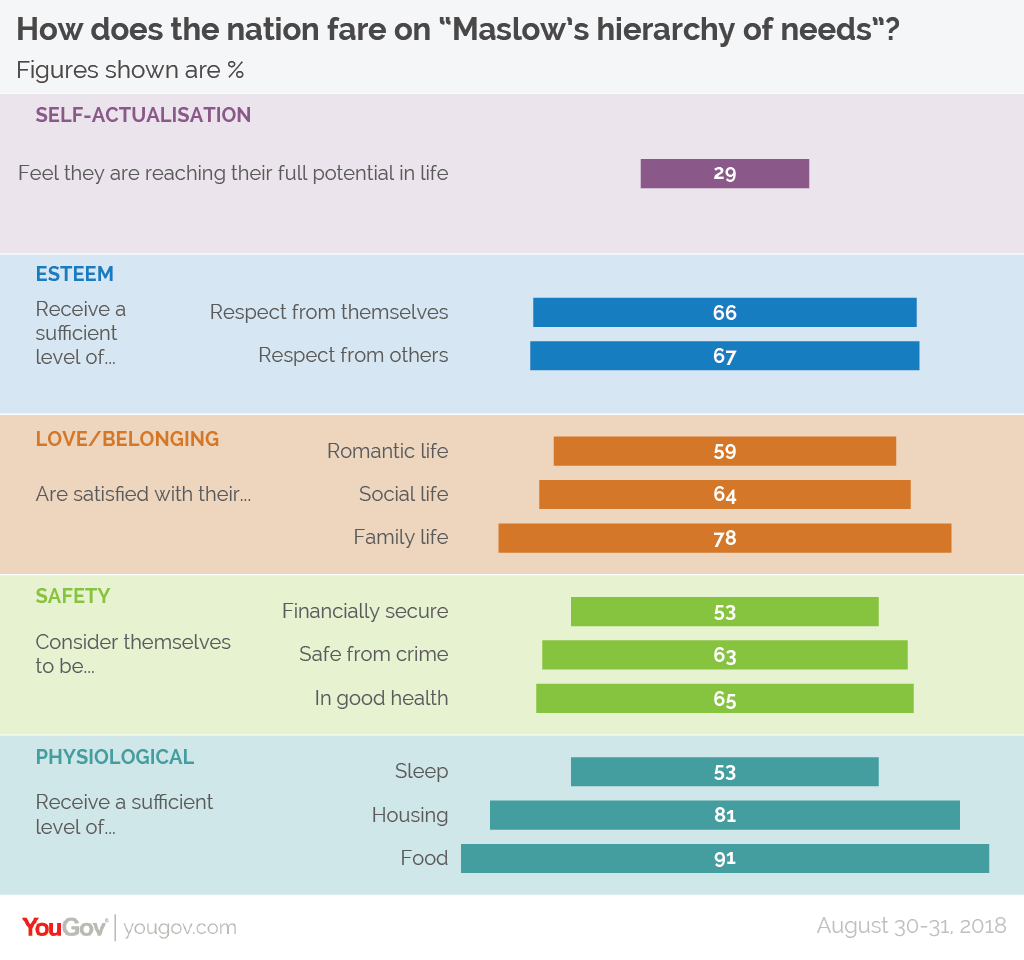
5. Physiological
The most utterly fundamental needs a human has to meet in order to survive. To represent ‘Physiological’ needs, YouGov asked Brits whether they are getting sufficient levels of food, housing and sleep.
While the vast majority of Britons believe that their food needs (91%) and housing needs (81%) are being sufficiently met, this figure plummets to 53% when it comes to sleep.
It is also notable that younger Britons are less likely to feel their physiological needs are being met than their elders, and that working class people are less likely to feel they are getting sufficient food (86%) and housing (75%) compared to their middle class peers (94% and 84% respectively).
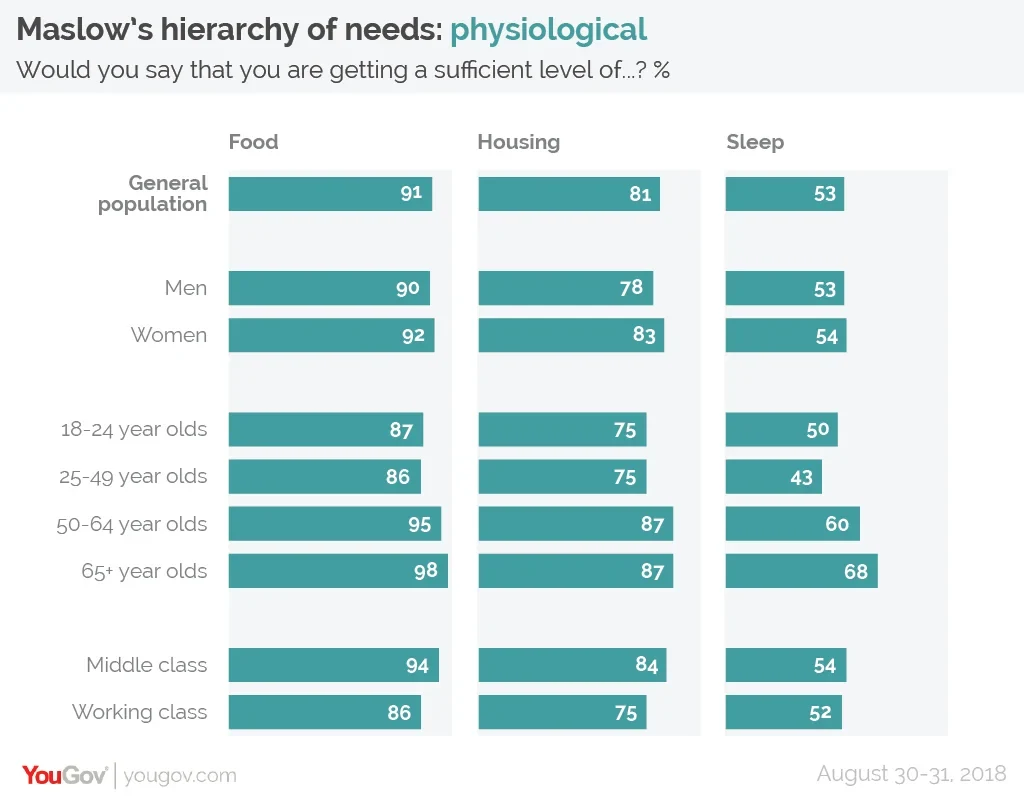
4. Safety
Once survival needs are met, the next set of needs revolve around safety. This does not just encompass physical safety against accidents and the like, but also such things as good health and financial security. To represent ‘Safety’ needs, YouGov asked Brits about their perceived safety from crime, good health and financial security.
Of these, Brits are most likely to consider themselves to be in good health (65%), with a similar number feelings safe from crime (63%). Just over half of Britons consider themselves financially secure (53%).
Those aged 65 and older are substantially more likely to feel financially secure than everyone else (71%, compared to 45-53% for the other age groups). Likewise, working class Brits are far less likely to feel financially secure than their middle class counterparts (40% vs 63%).
Working class people are also much less likely to feel safe from crime (53% vs 70% of middle class people), while 18-24 year olds are much more likely to feel safe from crime than all other age groups (76% compared to 60-62%).
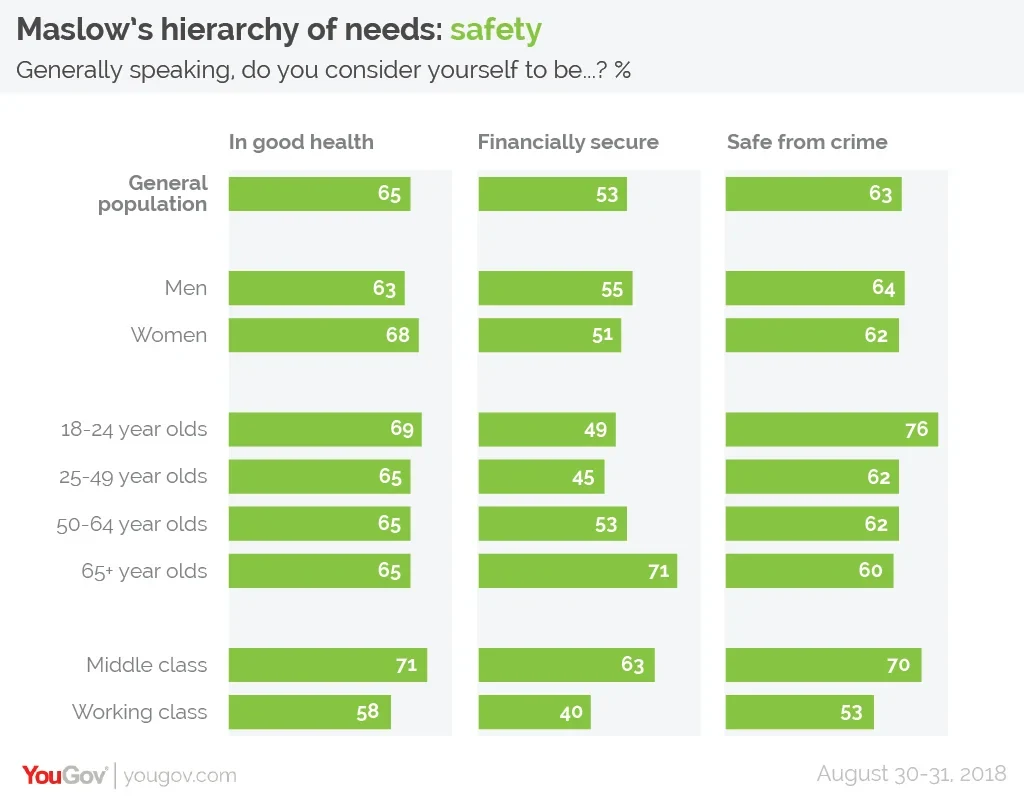
3. Love and Belonging
The next level of needs are social – our requirement to feel acceptance and a sense of belonging within social groups. To represent ‘Love and Belonging’ needs, YouGov asked people about the satisfaction they feel with their social life, romantic life and family life.
Brits are by far the most happy with their family life, with 78% expressing satisfaction here. Just under two thirds (64%) say the same about their social life, while a slightly lower 59% are content with their romantic life.
Younger people tend to feel less satisfied across all three measures. The gap is largest regarding social life, which only 56% of 18-24 year olds and 54% of 25-49 year olds are satisfied with compared to 80% of those aged 65+.
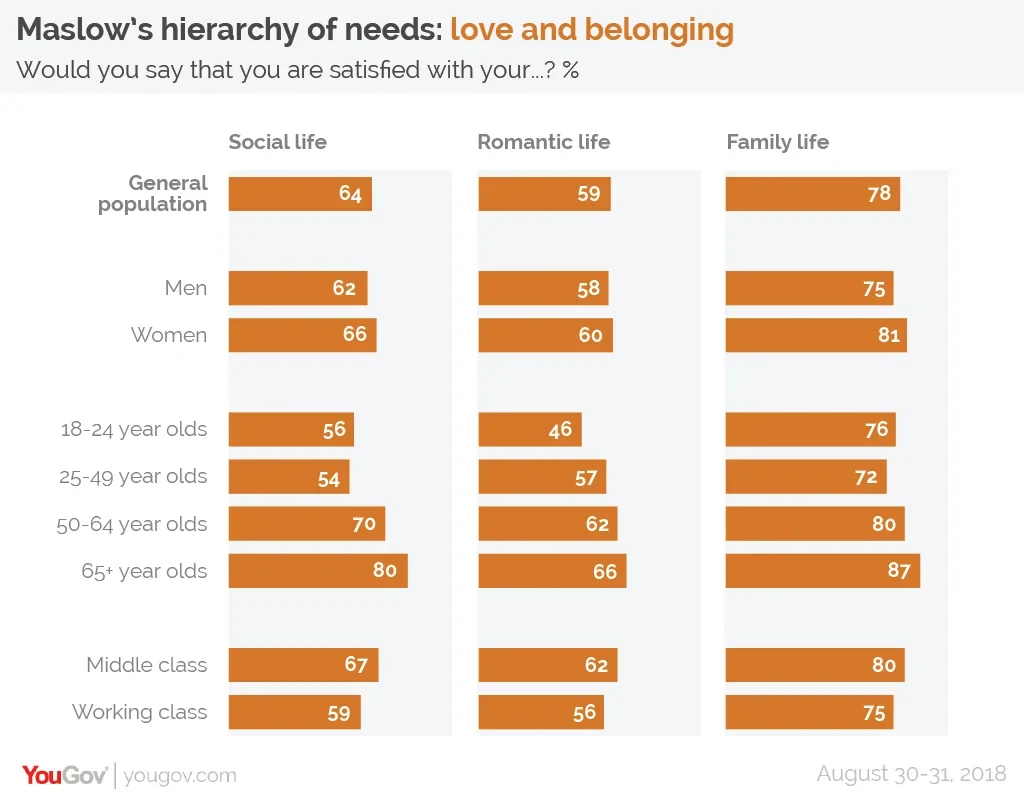
2. Esteem
Maslow held there to be lower and higher esteem needs – the lower represented by a need for respect from others and the higher being respect for oneself. To represent ‘Esteem’ needs, YouGov asked people whether or not they receive sufficient amounts of respect from others and indeed from themselves.
The responses to both were similar at the national level: 67% of Brits feel they get enough respect from those around them and 66% believe they give themselves enough self-respect.
These similarities belie key differences between age groups, however. Younger people are substantially less likely to think they give themselves a sufficient amount of self-respect – 52% of 18-24 year olds compared to fully 83% of 65+ year olds.
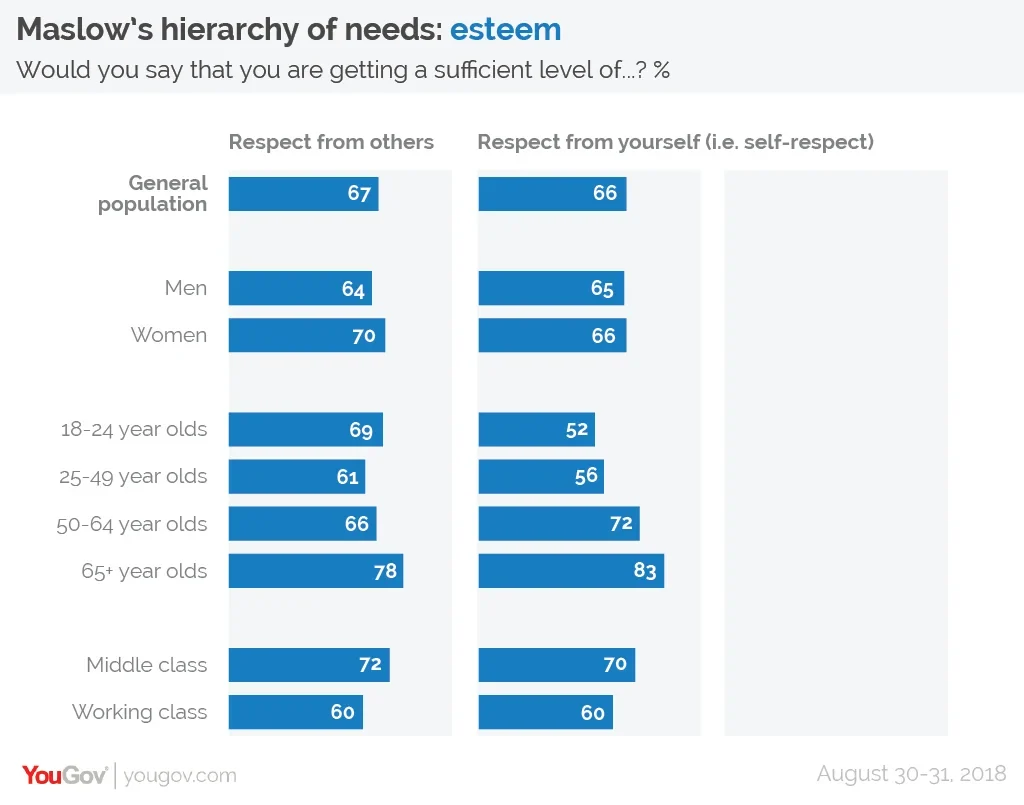
1. Self-Actualisation
The pinnacle of the hierarchy is “self-actualisation” – the reaching of a person’s full potential. To represent ‘Self-Actualisation’, YouGov asked people whether or not they feel like they are reaching their full potential in life.
Fewer than three in ten Brits (29%) believe that they are, with the majority (55%) saying they are not and the remaining 16% unsure.
Most sure that they are reaching their full potential are the nation’s elders. The over-65s are the only social group that is more likely to feel that they are reaching their full potential than not (47% vs 35%). By contrast, only 23% of 18-24 year olds believe they are, as do 18% of 25-49 year olds.
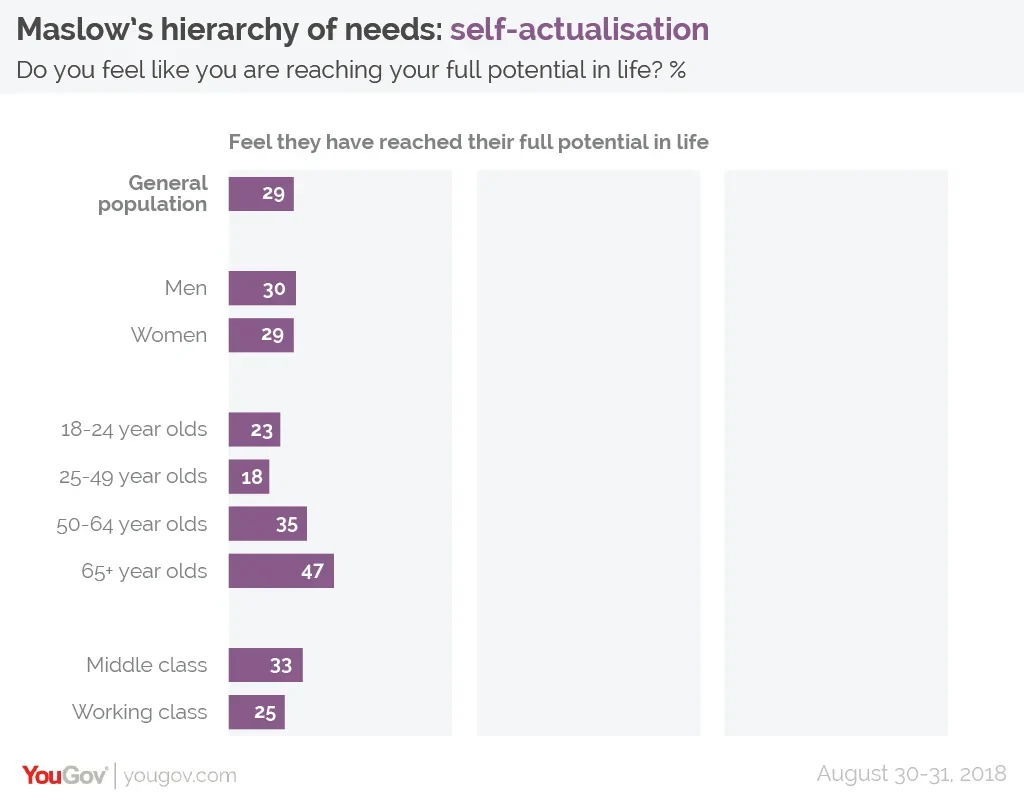
As mentioned above, the theory initially held that people could not progress from a lower hierarchy to a higher one until their needs had been sufficiently met. While the data shows this is clearly not the case, we thought it would still be interesting to see how many people have progressed fully through Maslow’s hierarchy. The answer is 10%, with the over-65s being the most likely (15%) and 25-49 year olds being the least (7%).
Photo: Getty
Full results coming shortly









